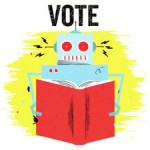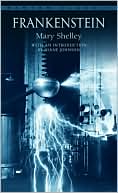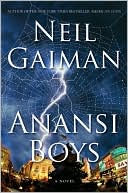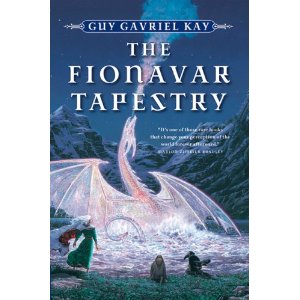If I didn’t already love NPR, I would now. But I’ve sat in the car too many times laughing myself silly at the Car Talk brothers not to love NPR.
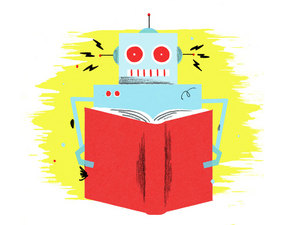 However, they just gave me a whole new reason to love them. NPR is putting together a list of the 100 best science fiction and fantasy (SF/F) titles “ever written”. The list will be based on recommendations submitted here.
However, they just gave me a whole new reason to love them. NPR is putting together a list of the 100 best science fiction and fantasy (SF/F) titles “ever written”. The list will be based on recommendations submitted here.
There are, naturally, a whole bunch of caveats built into this kind of thing. NPR wants this list to be strictly science fiction and fantasy for grown-ups (admittedly that term alone can be pretty loosely defined). YA SF/F will be covered some other summer. Besides, as NPR put it best, won’t it be nice to have someone besides Harry Potter win for a change?
Also, they are limiting to purely SF/F, so no paranormal or horror. Stephen King is out, and so is Sookie Stackhouse. So is Twilight. On the other, and much more interesting hand, it is perfectly okay to nominate an entire series as a single entity. So the Lord of the Rings counts as one nomination. Five noms to a posting, probably just to keep the lists manageable.
But my brain keeps hashing over what to nominate. There are two lists running in my head. One list is of the books/series that I have read and loved. Those are ones I would recommend in a heartbeat to someone who was remotely interested in science fiction or fantasy. Or someone I could get to sit still for ten seconds and listen.
 1. The Lord of the Rings. This is still a comfort read. Or a comfort listen. I have multiple copies in print, and both the unabridged recording and the radio play. Tolkien could write beautiful words, and there are parts of this thing that still ring in my head, and still wring my heart. The tvtropes wiki says there are 7 basic plots; 1)Overcoming the Monster, 2)Rags to Riches, 3)The Quest, 4)Voyage and Return, 5)Comedy, 6)Tragedy and 7)Rebirth. The Lord of the Rings has everything but a comedy plot. There’s comedy in there, but it isn’t a major plot thread.
1. The Lord of the Rings. This is still a comfort read. Or a comfort listen. I have multiple copies in print, and both the unabridged recording and the radio play. Tolkien could write beautiful words, and there are parts of this thing that still ring in my head, and still wring my heart. The tvtropes wiki says there are 7 basic plots; 1)Overcoming the Monster, 2)Rags to Riches, 3)The Quest, 4)Voyage and Return, 5)Comedy, 6)Tragedy and 7)Rebirth. The Lord of the Rings has everything but a comedy plot. There’s comedy in there, but it isn’t a major plot thread.
There are still things in LOTR I would like to have a serious talk with Prof. Tolkien about, if he were still around. The lack of female characters in the Fellowship. The shortage of strong female characters, period. And that’s just for starters. But the quibbles stand out because the whole is so very, very good.
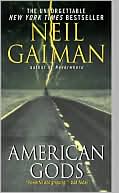 2. American Gods by Neil Gaiman. The premise caught me, and didn’t let go. Every deity that had every been worshiped on American soil was alive, if not well, somewhere in the U.S. Some are still active, and some are trying to blend in, but they are all still here. Then Shadow meets Mr. Wednesday on a plane, and everything starts to fall apart, or come together. American Gods is part of the great American road novel tradition, except it’s written by a British ex-pat who seems to have swallowed a mythopedic dictionary whole. The point where the Egyptian gods were running a funeral parlor in Cairo, Illinois, I think I had tears in my eyes, laughing. But there’s more pathos than humor, and every god and monster has his, or her, day. The ending took me by complete surprise. And I loved every second of it.
2. American Gods by Neil Gaiman. The premise caught me, and didn’t let go. Every deity that had every been worshiped on American soil was alive, if not well, somewhere in the U.S. Some are still active, and some are trying to blend in, but they are all still here. Then Shadow meets Mr. Wednesday on a plane, and everything starts to fall apart, or come together. American Gods is part of the great American road novel tradition, except it’s written by a British ex-pat who seems to have swallowed a mythopedic dictionary whole. The point where the Egyptian gods were running a funeral parlor in Cairo, Illinois, I think I had tears in my eyes, laughing. But there’s more pathos than humor, and every god and monster has his, or her, day. The ending took me by complete surprise. And I loved every second of it.
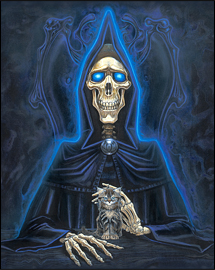 3. Discworld series by Terry Pratchett. Pratchett’s Discworld can be seen as a parody of any number of fantasy worlds. Or all of them. When he’s funny, he’s screamingly funny. But it’s the kind of humor that makes you think, and more and more, makes you want to weep. Havelock Vetinari, the Patrician of the city of Ankh-Morpork, makes Machiavelli look like an amateur. Death is personified as the bony gentleman with the scythe–on the other hand, his adopted granddaughter is considerably scarier than he is. After all, Death named his horse ‘Binky’. Start with either Mort or Guards, Guards. Just start.
3. Discworld series by Terry Pratchett. Pratchett’s Discworld can be seen as a parody of any number of fantasy worlds. Or all of them. When he’s funny, he’s screamingly funny. But it’s the kind of humor that makes you think, and more and more, makes you want to weep. Havelock Vetinari, the Patrician of the city of Ankh-Morpork, makes Machiavelli look like an amateur. Death is personified as the bony gentleman with the scythe–on the other hand, his adopted granddaughter is considerably scarier than he is. After all, Death named his horse ‘Binky’. Start with either Mort or Guards, Guards. Just start.
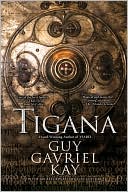 4. Tigana, by Guy Gavriel Kay. I would include this because reading it once hurt so much I’ve never been able to read it again. Tigana is a country that is lost, gone. It was not just conquered, it was also cursed. The wizard who conquered it laid down a curse that no one who was not born there before the fall could say the name, or hear it spoken. Tigana, beautiful, artistic, advanced, lovely as it was, was doomed to be forgotten in a generation. There was only one chance to save it. A desperate group of survivors banded together to infiltrate the court of the wizard king and assassinate him before the last of those born in their beloved country before its fall became too old to recreate what they had lost. What they did not count on was how long it would take, or how much the part you are playing becomes you, if you play it for too long.
4. Tigana, by Guy Gavriel Kay. I would include this because reading it once hurt so much I’ve never been able to read it again. Tigana is a country that is lost, gone. It was not just conquered, it was also cursed. The wizard who conquered it laid down a curse that no one who was not born there before the fall could say the name, or hear it spoken. Tigana, beautiful, artistic, advanced, lovely as it was, was doomed to be forgotten in a generation. There was only one chance to save it. A desperate group of survivors banded together to infiltrate the court of the wizard king and assassinate him before the last of those born in their beloved country before its fall became too old to recreate what they had lost. What they did not count on was how long it would take, or how much the part you are playing becomes you, if you play it for too long.
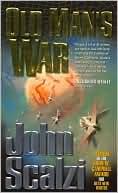 5. Old Man’s War, by John Scalzi. You know up front that this is not a coming-of-age story. More like wish-fulfillment, at least up to a point, as all the major characters start out as senior citizens who suddenly get brand new young bodies. Then they have to go fight aliens with those upgraded bods. This reads like one of Robert Heinlein’s space stories at its best, updated 50 years and without Heinlein’s attitudes about women. Or maybe that’s the updating. This is a great space opera. And because the point-of-view character is older, his perspective gets to use that life experience to wonder what the hell is going on. It’s a very important part of the story. He questions, and he wants answers. As he gets them, so does the reader.
5. Old Man’s War, by John Scalzi. You know up front that this is not a coming-of-age story. More like wish-fulfillment, at least up to a point, as all the major characters start out as senior citizens who suddenly get brand new young bodies. Then they have to go fight aliens with those upgraded bods. This reads like one of Robert Heinlein’s space stories at its best, updated 50 years and without Heinlein’s attitudes about women. Or maybe that’s the updating. This is a great space opera. And because the point-of-view character is older, his perspective gets to use that life experience to wonder what the hell is going on. It’s a very important part of the story. He questions, and he wants answers. As he gets them, so does the reader.
These books are ones I have read, finished and would recommend unconditionally. In another post, I’ll list the ones I want to read this summer, and why.
![]() NPR is at it again! It’s summer, so they’re in the midst of what looks like it’s becoming an annual tradition. And what a terrific annual tradition it is.
NPR is at it again! It’s summer, so they’re in the midst of what looks like it’s becoming an annual tradition. And what a terrific annual tradition it is. Last year they asked their readers to nominate, and finally vote on, the Top 100 Science Fiction and Fantasy books for adults “ever written”. Talk about endless debate amongst the fans. I had a lot of fun with that one. I love both genres.
Last year they asked their readers to nominate, and finally vote on, the Top 100 Science Fiction and Fantasy books for adults “ever written”. Talk about endless debate amongst the fans. I had a lot of fun with that one. I love both genres. I said it’s a tradition. In the summer of 2009, NPR asked for the Best Beach Books Ever. Great theme for the first time out. In 2010, they asked for “Killer Thrillers”, and made a killing on the poll, with 17,000 ballots turned in.
I said it’s a tradition. In the summer of 2009, NPR asked for the Best Beach Books Ever. Great theme for the first time out. In 2010, they asked for “Killer Thrillers”, and made a killing on the poll, with 17,000 ballots turned in.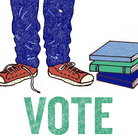 Just like the Top SF/F poll last year, the Best-Ever Teen Novels poll is just that. A poll. You can vote for the ones you think are the best, even if your teen years are a few decades behind you.
Just like the Top SF/F poll last year, the Best-Ever Teen Novels poll is just that. A poll. You can vote for the ones you think are the best, even if your teen years are a few decades behind you.
